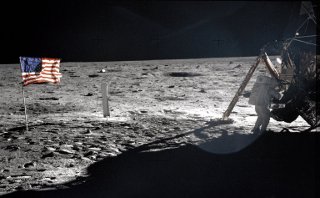Neil Armstrong on the Moon: This is one of the few photographs of Neil Armstrong on the Moon; most images are of Buzz Aldrin. Neil Armstrong is standing in the shadow of the Eagle lunar module. The image was captured by Buzz Aldrin.
Credit: NASA/JSC
When President John F. Kennedy declared that Americans would go to the Moon, he said, “We’re not doing it because it’s easy, we’re doing it because it’s hard.” He felt that because it was hard it would bring our best forces forward, our best capabilities, and would demonstrate for everyone that our capabilities are there and we can do the most amazing things. This is partly a matter of national pride, and in part, it is cultural. No one can say that it is of great practical importance to know about the formation of the Universe and how it has brought us to life here on our little planet. On the other hand, vast numbers of people care deeply about this.
I would say that we pursue scientific questions through these kinds of projects because the people want us to do this work. I think people are thrilled with exploration; it seems to be a part of our human nature. Science is an organized way of exploring the world. We are able to get scientific results that are also very meaningful to the public. When you visit the conference room for the House Committee on Science and Technology in Washington, you will see that the walls are covered with pictures of astronomy and space shuttles, Apollo landings, things like that. Our country is proud of this. Why are we proud of it? I think space exploration touches something very deep within us: that we just want to know.
When I was six or so, I asked my dad, “How did we get here? Where do people come from?” Of course, there was no answer available in those days except in the most general terms. In sixty years, we have made immense progress, and the answers are really exciting. People care about these questions. And scientists are always working on the stuff that we don’t know, and we are always discovering things. We’re turning over rocks and looking for bugs, just like six-year-old children do. Children are born curious, and scientists are paid to be curious! My perspective is that we’d like to have as much company as we can on these ventures of discovery. We’re all in this together, after all.


